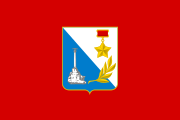Governor of Sevastopol (Russia)
The Governor of the City of Sevastopol (In Russian: Губернатор города Севастополя; In Ukrainian: Губернатор міста Севастополя) is head of the executive branch of the political system in the city of Sevastopol. The governor's office administers all city services, public property, police and fire protection, most public agencies, and enforces all city and state laws within Sevastopol.
| Governor of the City of Sevastopol | |
|---|---|
 Flag of the City of Sevastopol | |
.jpg) Mikhail Razvozhaev since 11 July 2019 | |
| Style | elected by deputies of Legislative Assembly of Sevastopol |
| Residence | 2 Lenin's Street, Sevastopol |
| Term length | 5 years |
| Inaugural holder | Pavel Pereleshin |
| Formation | February 7, 1872 |
| Website | City State Administration |
The governor's office is located on Lenin Street. It has jurisdiction over all districts of Sevastopol. The governor appoints many officials, including Directors who head city departments, and his or her deputy governors.
Prior to the annexation of Sevastopol by Russia, the city administrator was called the Chairman of Sevastopol City State Administration, and often referred to as the Mayor of Sevastopol. During this period in which Sevastopol functioned as a city with special status within Ukraine, the city administrator was appointed by the President of Ukraine.[1] Since the 2014 Crimean crisis, the status of the Crimea and of the city of Sevastopol is under dispute between Russia and Ukraine; Ukraine and the majority of the international community considers the Crimea and Sevastopol an integral part of Ukraine, while Russia, on the other hand, considers the Crimea and Sevastopol an integral part of Russia, with Sevastopol functioning as a federal city within the Southern Federal District.[2][3][4]
The first mayor was Vice Admiral Pavel Pereleshin, beginning in 1872. Pereleshin started the reconstruction of the city after the Crimean War.
List of Governors
War/Military Governors
- 1802–1811: Ivan de Traversay
- 1811: Roman Gall
- 1811–1816: Nikolai Yazikov
- 1816–1829: Aleksey Greig
- 1829–1830: Andrei Turshaninov
- 1830: Nosov
- 1830: Nikolai Stolypin
- 1830: Andrei Turshaninov
- 1830–1833: Aleksey Greig
- 1833–1851: Mikhail Lazarev
- 1851–1852: Maurice Berg
- 1852–1854: Mikhail Stanyukovich
- 1852–1854: Vladimir Kornilov (as commander-in-chief)
- 1854–1855: Pavel Nakhimov
- 1855: Feyodor Novosilsky
- 1855–1856: Nikolai Metlin
- 1856: Aleksander Panfilov
- 1856–1857: Grigory Butakov
- 1857–1858: Feodesiy Bartenev
- 1858–1865: Peter Kislinsky
Gradonachalnik (Chiefs of the City Municipality)
- 1872–1873: Pavel Pereleshin
- 1873–1876: Mikhail Kazy
- 1876–1882: Andrei Nikonov
- 1882–1885: Ivan Rudnev
- 1885–1891: Mikhail Kumany
- 1891–1896: Ivan Lavrov
- 1896–1899: Constantine Valrond
- 1899–1902: Evgeny Feodosyov
- 1902: Nikolai Khvostov
- 1902–1905: Alexander Spitsky
- 1905–1906: Evgeny Rogulia
- 1906–1909: Vladimir Morenshield
- 1909–1913: Sergey Kulstrem
- 1913–1917: Sergei Burley
- 1917–1917: Sergei Nikonov (as city's commissar and mayor)
- 1917–1918: Yuriy Gaven (as head of military revkom)
- 1918–1919: unknown
- 1919–1920: Vladimir Subbotin
- 1920 (April-May) : Vladimir Sidorin
- 1920: Aleksei Baranov (as commandant)
First Secretaries of the City Committee of the Communist Party
- 1917: Nikolai Pozharov
- 1917–1918: Yuriy Gaven
- 1918–1922: unknown
- 1922–1924: Ivan Nosov
- 1924–1930s: unknown
- ?–1937: Alexander Levitin
- 1937–1938: Kiselyov
- 1938–1940: unknown
- 1940–1942: Boris Borisov
- 1944–1954: unknown
Predsidatel Gorispolkoma (Chairman of the City Executive Committee)
- 1920–1921: Semyon Krylov
- 1921–1938: unknown
- 1938–1942: Vasiliy Yefremov
- 1942–1944: (Nazi Germany occupation)
- 1944–1946: Vasiliy Yefremov
- 1946–1948: unknown (Pavel Levin as secretary in 1947–?)
- 1948–1949: V.Filippov
- 1949–1950: unknown
- 1950–1954: Serhiy Sosnytskyi
Burgermeister (under Nazi occupation)
- 1942: Madatov
- 1942–1943: Supryagin
Soviet and Independent Ukrainian period (1954–2014)
Governors
- 2014: Aleksei Chaly (acting)
- 2014–2016: Sergey Menyaylo[5][6]
- 2016–2019: Dmitry Ovsyannikov[7]
- 2019–present: Mikhail Razvozhayev (acting)[8]
See also
- Governor of Sevastopol (Ukraine)
- Sevastopol City Council
- Sevastopol Police
- Mayor of Moscow
- Governor of Saint Petersburg
References
- Contemporary Ukraine: Dynamics of Post-Soviet Transformation by Taras Kuzio, M.E. Sharpe, 1998, ISBN 978-0-7656-0224-4 (page 44)
- Gutterman, Steve. "Putin signs Crimea treaty, will not seize other Ukraine regions". Reuters.com. Retrieved 26 March 2014.
- Ukraine crisis timeline, BBC News
- UN General Assembly adopts resolution affirming Ukraine's territorial integrity Archived 2018-03-04 at the Wayback Machine, China Central Television (28 March 2014)
- (in Russian) Меняйло утвержден губернатором Севастополя на фоне конфликта с Чалым (9 October 2014)
- Acting from April 14, 2014 to October 9, 2014
- Крымский федеральный округ включен в состав Южного федерального округа (in Russian). Interfax. 28 July 2016. Retrieved 28 July 2016.
- Встреча с Михаилом Развожаевым